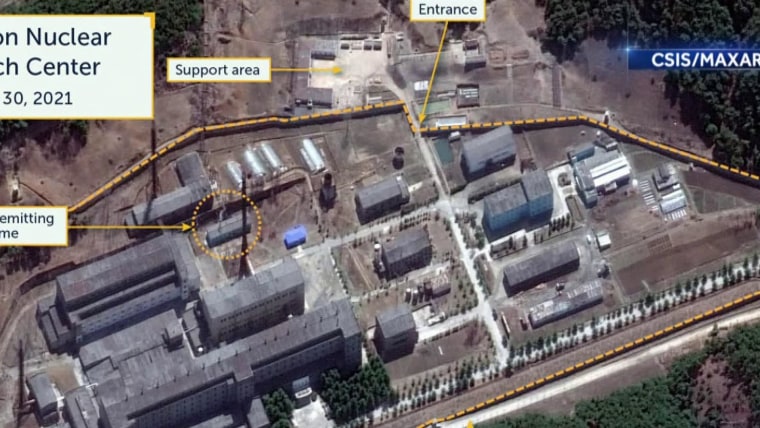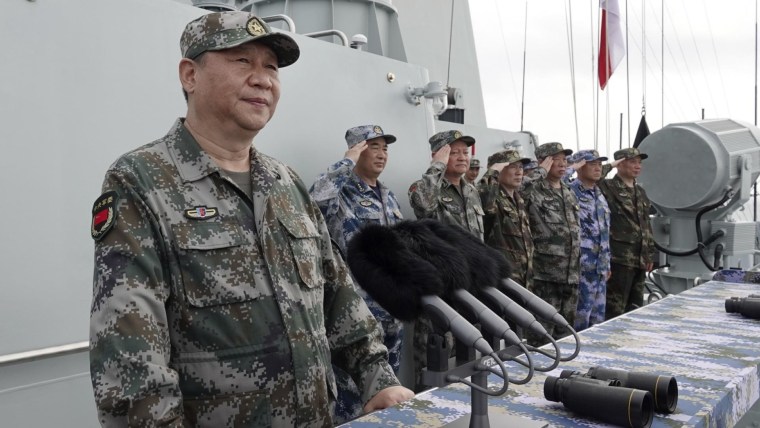WASHINGTON — Ever since North Korea began building nuclear weapons in the 1990s, the policy of the United States has been clear: Give up those bombs or face international isolation.
After three decades of sanctions, threats of force and diplomacy — including President Trump’s theatrical summits with North Korean leader Kim Jong Un — North Korea now has more nuclear weapons than ever, plus ballistic missiles that intelligence officials say could deliver a warhead to the U.S. And because of the global pandemic, the hermit kingdom has shuttered its borders, halting imports of food and medicine in a way more punishing than international sanctions could ever be.
That dangerous security threat is now in President Joe Biden’s lap, and his administration is expected to announce the results of a policy review on North Korea soon. Experts and people briefed on it say they expect that while Biden will not formally abandon the goal of “total denuclearization,” he will attempt to achieve the more limited aim of diminishing North Korea’s nuclear threat, while at the same time seeking to lower the visibility of a thorny foreign policy problem that has no neat solution.
“Realistically speaking, the administration’s North Korea strategy will probably be open to (an) approach in which North Korea’s capabilities are capped or limited,” Eric Brewer, who worked on North Korea policy at the National Security Council in the Obama administration, told NBC News. “Even if denuclearization remains a component of the strategy, I find it hard to believe they wouldn’t be open to more interim solutions that reduce the threat.”
The administration also plans to seek to reinvigorate the so-called trilateral relationship between the U.S., South Korea and Japan, according to a former Trump administration official who has been consulted.
Whether there are direct talks with the North Koreans depends on the North’s behavior, that person said.
While denuclearization would remain a long-term goal, the U.S. could try to persuade North Korea to agree to restrictions on its delivery systems for nuclear weapons in return for substantial relief from economic sanctions, Brewer said. If unchecked, those delivery systems, including solid-fuel missiles, ICBM warheads and multiple re-entry vehicles, could allow North Korea to launch attacks faster and potentially evade U.S. countermeasures.
Brewer recently co-authored an article in Foreign Affairs with Sue Mi-Terry, who worked on the National Intelligence Council under President Obama and served as a CIA analyst, arguing for a “realistic bargain” with North Korea.
The two, who are both now senior fellows at the Center for Strategic and International Studies, wrote that the fallout from the Covid-19 pandemic has exacerbated the regime’s economic woes, and could mean North Korean leader Kim Jong Un would be open to cutting a deal.
“Kim has not been easily swayed by economic pressure in the past,” they wrote, but it is possible he is desperate enough for sanctions relief — and confident enough in his existing nuclear and missile capabilities — that he would trade some limits on his weapons programs for a significant reduction in sanctions.”
In an interview, Terry told NBC News, “Right now, we are looking to re-engage with North Korea in some form.”
Victor Cha, who oversaw Korea policy in the George W. Bush administration, agreed.
He noted that North Korea has shut down its borders completely in an effort to tamp down the spread of Covid-19, including imports of food and medicine from China. In so doing, it has imposed a blockade on itself more draconian than sanctions, which don’t usually cover humanitarian aid.
“This is about as maximum as the sanctions can be and it’s all self-imposed,” said Cha, who said Biden may want to offer pandemic-related aid as a gesture of goodwill.
Even with a less ambitious objective, arms control negotiations with North Korea would be “really, really hard,” Brewer said, particularly because Pyongyang has tended to fiercely resist any inspection or verification mechanisms. And any restrictions on the North’s weapons systems would have to be verified on the ground, he said, not just via U.S. intelligence surveillance.
Intelligence officials say North Korea has no intention of giving up its nuclear weapons, leaving the Biden administration faced with a series of unpalatable options. They range from attempting to restart talks that have a history of failure to a military strike that could have disastrous repercussions.
“North Korea will be a WMD threat for the foreseeable future, because [Kim Jong Un] remains strongly committed to the country’s nuclear weapons, the country is actively engaged in ballistic missile research and development, and Pyongyang’s (chemical and biological) efforts persist,” says an unclassified intelligence assessment released Tuesday by the Office of the Director of National Intelligence.
After two failed presidential summits with Trump, North Korea has greeted the incoming Biden team with a series of provocations, including harsh rhetoric and a short-range missile test. But so far, the regime has not taken the far more provocative steps of testing a long-range missile or a nuclear weapon, both of which it has done previously.
There is always a chance, however, that Biden’s bid for negotiations fails, and North Korea falls back on its pattern of aggressive and attention-seeking behavior, including threatening its neighbors and testing dangerous weapons. If that happens, the only real option short of war — covert CIA operations aside — is more economic sanctions, experts say.
Critics point out that years of sanctions of various kinds have failed to convince the North to denuclearize. But in fact, observers say, the U.S. has never mounted the sort of sustained and biting sanctions campaign against North Korea that the Obama administration used to push Iran to bargain, resulting in a 2015 nuclear agreement from which Trump withdrew, but which Biden is seeking to restore.
“It took three years of really hard sanctions for Iran to come to the negotiating table,” Terry said.
Those sanctions included penalties against European and other banks accused of violating the law by doing business with Iran. So far, no administration has been willing to levy similar “secondary sanctions” against Chinese banks that keep North Korea afloat.
“The U.S. imposed $8 billion to $9 billion in fines on U.K. and French banks for money laundering for Iran, but $0 in fines on Chinese banks for money laundering for North Korea,” said Bruce Klingner, a former CIA analyst and Korea expert at the Heritage Foundation.
Klingner and other North Korea experts cite a single telling exception to that rule: An action against an obscure bank in Macau that they say could be a blueprint for putting the squeeze on North Korea.
The Treasury Department imposed sanctions on Banco Delta Asia in 2005, accusing it of laundering money for the North Korean regime. Soon, more than two dozen financial institutions had pulled back from doing business with North Korea, imperiling its finances. Even many top U.S. officials were surprised at how hard the sanctions had bitten.
“You Americans finally have found a way to hurt us,” Cha, then the point person on Korea policy, recalls an inebriated North Korean diplomat mumbling during a round of toasts at a negotiation.
But two years after the sanctions on the bank were imposed — including the freezing of $25 million in North Korean assets — the U.S. gave the money back, paving the way for North Korea to re-enter the international banking system. It was part of a deal that was supposed to result in the unwinding of North Korea’s nuclear weapons program.
That didn’t happen, of course, yet no similar sanctions have been levied since.
Joshua Stanton, who runs the blog OneFreeKorea and is one of the foremost experts on North Korea sanctions, argues that United Nations reports on sanctions compliance regularly provide evidence that could be used to penalize companies, but the U.S. has rarely acted on that material.
“Why are we more tolerant of Chinese banks violating North Korea sanctions than Barack Obama was of European banks that violated Iran sanctions?” asked Stanton.
One reason, Cha and others say, is because the U.S. has long sought China’s help in pressuring North Korea.
“We’ve always been careful about going after Chinese,” Cha said. “It’s a balancing act — there’s a desire to have Chinese cooperation in the negotiations.”
In order for diplomacy to work, it must be backed by a credible threat of force, the former Trump administration official and other experts say.
“The only way to get the North to agree to anything is sanctions plus a military threat, and diplomatic pressure,” the former official said.
In response to questions from NBC News, a spokesperson for the National Security Council said, “The North Korea review is in its final stages and we’re not going to get ahead of that.”


